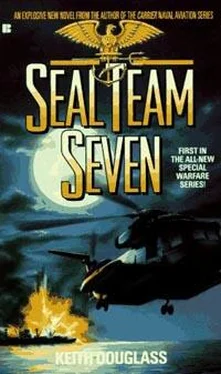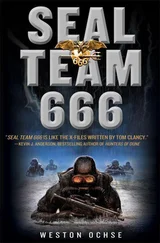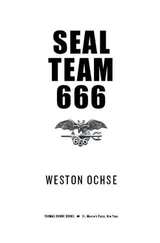Keith Douglass - Seal Team Seven
Здесь есть возможность читать онлайн «Keith Douglass - Seal Team Seven» весь текст электронной книги совершенно бесплатно (целиком полную версию без сокращений). В некоторых случаях можно слушать аудио, скачать через торрент в формате fb2 и присутствует краткое содержание. Жанр: Боевик, на английском языке. Описание произведения, (предисловие) а так же отзывы посетителей доступны на портале библиотеки ЛибКат.
- Название:Seal Team Seven
- Автор:
- Жанр:
- Год:неизвестен
- ISBN:нет данных
- Рейтинг книги:3 / 5. Голосов: 1
-
Избранное:Добавить в избранное
- Отзывы:
-
Ваша оценка:
- 60
- 1
- 2
- 3
- 4
- 5
Seal Team Seven: краткое содержание, описание и аннотация
Предлагаем к чтению аннотацию, описание, краткое содержание или предисловие (зависит от того, что написал сам автор книги «Seal Team Seven»). Если вы не нашли необходимую информацию о книге — напишите в комментариях, мы постараемся отыскать её.
Their cargo includes two tons of weapons-grade plutonium. And now, with enough nuke fuel to arm a superpower, an alliance of fanatics threatens to poison a continent.
In a daring mission of high-seas heroism, Lt. Blake Murdock leads his seven-man unit from Team Seven's Red Squad into bulkhead-to-bulkhead battle — with high-tech
buccaneers who've got nothing left to lose...
Seal Team Seven — читать онлайн бесплатно полную книгу (весь текст) целиком
Ниже представлен текст книги, разбитый по страницам. Система сохранения места последней прочитанной страницы, позволяет с удобством читать онлайн бесплатно книгу «Seal Team Seven», без необходимости каждый раз заново искать на чём Вы остановились. Поставьте закладку, и сможете в любой момент перейти на страницу, на которой закончили чтение.
Интервал:
Закладка:
"One further disturbing development has been detected by our satellites. Five hours ago, well before dawn in the Persian Gulf, a large flotilla left Bandar Abbas, heading south. This flotilla consists of one guided-missile destroyer, the Damavand, two frigates, Alborz and Sahand, and four Combattante II-class patrol boats. Since this represents a considerable fraction of iran's total naval force, we can only assume that Tehran is taking current events in the Indian Ocean very seriously indeed. What we do not yet know is whether this flotilla has been deployed to support the Yuduki Maru, or to combat the dissident forces that have hijacked her. From our perspective, it doesn't really matter which. It is the NSC's consensus that neither Iran nor an Iranian splinter group can be permitted access to Yuduki Maru's cargo.
"In any case, the crewmen brought back by the SEALs may be able to shed new light on the situation. At this point in the proceedings, I'd like to turn the podium over to Mr. Hadley, who has some additional intelligence for us. Mr. Hadley?"
The CIA man took Kerrigan's place at the podium. "Thank you, Admiral. I have little to add at this point, except for an interesting development that was telexed back to Langley from intelligence officers aboard the U.S.S. Nassau.
"It turns out that one of the Japanese crewmen retrieved by Lieutenant Murdock's people is, in fact, one of the original terrorists who seized the Yuduki Maru."
A stir ran through the listeners in the room. This was new, and unexpected.
"The man Murdock rescued from the freighter's bridge is who he claims to be, Jiro Kurosawa, a merchant marine employee of the company running the Yuduki Maru.
"The other man, however, who was intercepted near the freighter's engine room by, um, Chief MacKenzie, has been positively identified by Kurosawa as one of the new merchant seamen who produced concealed weapons last Wednesday and seized the ship.
"While the prisoner has not yet talked, his fingerprints were faxed to Langley, where they were matched with those of Shigeru Ota, a low-ranking member, a soldier really, of the Japanese Ohtori."
"Ohtori?" Kerrigan asked, interrupting. "What the hell's that?"
"A new and radical offshoot of the old Japanese Red Army. 'Ohtori' corresponds roughly to the West's 'phoenix."'
"The fabulous bird reborn from its own ashes," Mason said. He spoke softly, more to himself than to anyone else in the room, but Hadley heard him and nodded. "Exactly. The JRA was one of the more extremist terrorist groups of the seventies. They were behind a number of terrorist incidents but are probably best remembered for the Lod Airport Massacre in Israel in 1972, where they killed twenty-six people. In the early eighties their leader renounced violence as a political weapon, but they reportedly are still based in the Middle East. Ohtori may be a pro-violence splinter group with their own agenda."
"One working with the Iranians?" Admiral Bainbridge asked.
"Either with the Iranians, or with an Iranian faction," Hadley replied. "The JRA has reportedly been based in the Middle East ever since the early seventies, with training camps in Libya and Syria. Though they've been more closely associated with the PFLP and other Palestinian groups, it is possible that they've taken up the cause of the international Shiite revolution sponsored by Iran." Hadley ran one hand through his untidy fringe of white hair. "Whatever their goals, we can be certain that they are inimical to Western interests. They are anti-Israel, anti-American, and in favor of overthrowing the established order by armed revolution. It could be that they've decided to provide some additional arms to the revolution in the guise of the two tons of plutonium on that ship."
"What about the Greenpeace schooner," Admiral Bainbridge asked him. "What's her name? Beluga."
"We've not been devoting satellite time to them, of course," Hadley told him. "But our AWACS radar surveillance pinpoints them still on Yuduki Maru's tail, about twenty to thirty miles astern."
"Someone should warn them off," Captain Coburn pointed out. "I'd hate to see more civilians mixed up in this."
"Actually, they've been quite useful so far," Hadley said. "They called in the original report after Shikishima was sunk, and they've been filing position reports daily ever since."
"Sure, but we have satellites to tell us where the freighter is. And these people are going to draw a lot of unwanted publicity onto our operation."
"Actually," Hadley said, "while there was some legitimate concern over media publicity during Operation Sun Hammer, the Security Council has decided that Beluga's presence in the area can become an asset."
"Christ," Mason said. "How?"
"First off," Hadley replied, "the negative publicity if we move in and order Beluga out of there could generate adverse world opinion. Beluga is registered to Greenpeace, but her owner of record is a German millionaire named Rudi Kohler. He's one of the top eight or ten people in the Green Party movement, a prominent anti-nuclear activist and he's a big name in the European news media. Owns half a dozen major papers and news magazines in Germany, France, and Italy. We barge in and order him out of there, and I guarantee that we're going to be accused of censorship, police-state tactics, and probably wife-beating as well.
"On the other hand, if Kohler is present when the U.S. Marines seize the Yuduki Maru and prevent an eco-disaster, our role in this affair will be seen in a positive light."
"And what happens," Admiral Bainbridge said slowly, "if something goes wrong in front of these people? If the terrorists blow up the freighter, for example, and end up contaminating half of the East African coast?"
Hadley gave him a humorless smile. "In that event, Admiral, I'm afraid all of the public relations in the world won't help. And we'll have more to worry about than Rudi Kohler's newspaper syndicate.
"That's all that I have at the moment, if there are no further questions. I will, of course, pass on further developments as they become available." He stepped back from the podium. "Admiral Kerrigan?"
"Thank you, Brian." Kerrigan again changed places with the Agency man. "Okay, gentlemen. I'm sure you're all eager to know just what part the Navy Special Warfare community is going to play in Operation Deadly Weapon."
Here it comes, Mason thought. He had the distinct feeling that Kerrigan was setting up the SEALs as part of his own power play. The way he'd phrased it, "is going to play," suggested that NAVSPECWAR was now, at last, right where he wanted it.
"Since SEAL Seven's Third Platoon is already aboard the Nassau, they will be temporarily assigned to II MEF, under the command of General Vonnegut. They'll be pretty busy for the next few days as they undergo their mission debriefs. I will pass the word to Admiral Winston and General Vonnegut that they will be available for Deadly Weapon, if the site commanders deem their participation advisable. Yes, Admiral?"
"Ah, Admiral Kerrigan," Bainbridge said. "Wouldn't it be advisable to deploy additional Special Warfare groups to the region? Captain Coburn could have the rest of SEAL Seven in place by..."
"No, Admiral, it would not," Kerrigan said. "The Marines have their own special recon units, of course, and I very much doubt that your people could add much to the overall force picture. My staff will advise you of further developments. That is all."
With a gesture of his head, he gathered in his retinue of aides and staffers and vanished from the room. For several moments, a low buzz of conversation rumbled among the SEAL personnel who remained.
Kerrigan, it was clear, had just scored the victory over the Special Warfare community that he'd been searching for years; SEAL Seven's failure aboard the Yuduki Maru had given him the leverage he needed to all but exclude the SEALs from Deadly Weapon.
Читать дальшеИнтервал:
Закладка:
Похожие книги на «Seal Team Seven»
Представляем Вашему вниманию похожие книги на «Seal Team Seven» списком для выбора. Мы отобрали схожую по названию и смыслу литературу в надежде предоставить читателям больше вариантов отыскать новые, интересные, ещё непрочитанные произведения.
Обсуждение, отзывы о книге «Seal Team Seven» и просто собственные мнения читателей. Оставьте ваши комментарии, напишите, что Вы думаете о произведении, его смысле или главных героях. Укажите что конкретно понравилось, а что нет, и почему Вы так считаете.












